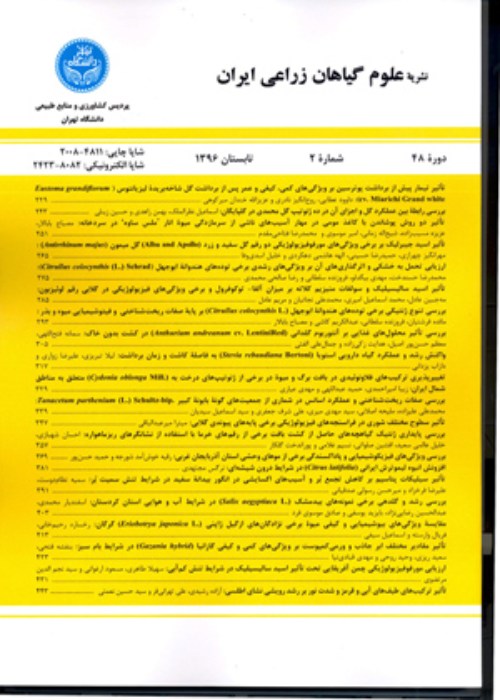Effect of Phosphate Biofertilizers on Yield and Yield Components of Grain Corn (Zea mays L. S.C.704) under Water Deficit Stress Conditions
Abstract:
The effect of seed inoculation by phosphate solubilizing microorganisms on growth, yield and nutrient uptake of maize (Zea mays L. SC. 704) was studied in a field experiment. This experiment was conducted in Meshkin Abad Experimental Station during 2005. The experiment design consisted of four randomized complete blocks in a split-factorial arrangement. The main-plots regarding simulating water deficit stress levels consisted of three water regimes, achieved by scheduling cumulative pan evaporation in mm. The irrigations were scheduled for various treatments, when the cumulative pan evaporation readings reached 70, 100 and 130 mm. The sub-plots included the application of microbial inoculants [Glomus intraradices; Pseudomonas fluorescens strain 93; Glomus intraradices + Pseudomonas fluorescens strain 93] and none [triple super phosphate fertilizer; without fertilizer (control)]. Positive effects on plant growth, nutrient uptake, grain yield and yield components in maize was recorded in the treatment receiving mixed inoculums of Glomus intraradices (AM) and Pseudomonas fluorescens (Pf). Co-inoculation treatment significantly increased grain yield, yield components, harvest index, grain N and P, soil available P and root colonization percentage under water deficit stress. Seed inoculation with only AM positively affected the measured parameters as much as co-inoculated treatments. In some investigated characteristics under well-watered conditions, chemical fertilizer treatment was superior to co-inoculated treatments, but the difference was not significant. According to the results obtained, in contrast to the inoculated treatments with AM+Pf and AM, the application of Pf alone led to a comparatively poor response. Therefore, this microorganism needs a complement for its activity in soil. All the assessed parameters in inoculated treatments were of higher values than those in the uninoculated treatments under water deficit stress conditions. Furthermore, the investigated characteristics of co-inoculated plants under severe water deficit stress were significantly less pronounced than co-inoculated plants under well-watered and moderate-stressed conditions. Therefore it could be stated, these microorganisms need more time to fix and establish themselves in soil. The present finding showed that phosphate-solubilizing microorganisms can positively interact in promoting plant growth as well as in P uptake in maize plants, leading to plant tolerance improving under water deficit stress conditions.
Language:
Persian
Published:
Iranian Journal of Field Crop Science, Volume:40 Issue: 1, 2009
Page:
15
magiran.com/p743605
دانلود و مطالعه متن این مقاله با یکی از روشهای زیر امکان پذیر است:
اشتراک شخصی
با عضویت و پرداخت آنلاین حق اشتراک یکساله به مبلغ 1,390,000ريال میتوانید 70 عنوان مطلب دانلود کنید!
اشتراک سازمانی
به کتابخانه دانشگاه یا محل کار خود پیشنهاد کنید تا اشتراک سازمانی این پایگاه را برای دسترسی نامحدود همه کاربران به متن مطالب تهیه نمایند!
توجه!
- حق عضویت دریافتی صرف حمایت از نشریات عضو و نگهداری، تکمیل و توسعه مگیران میشود.
- پرداخت حق اشتراک و دانلود مقالات اجازه بازنشر آن در سایر رسانههای چاپی و دیجیتال را به کاربر نمیدهد.
In order to view content subscription is required
Personal subscription
Subscribe magiran.com for 70 € euros via PayPal and download 70 articles during a year.
Organization subscription
Please contact us to subscribe your university or library for unlimited access!


